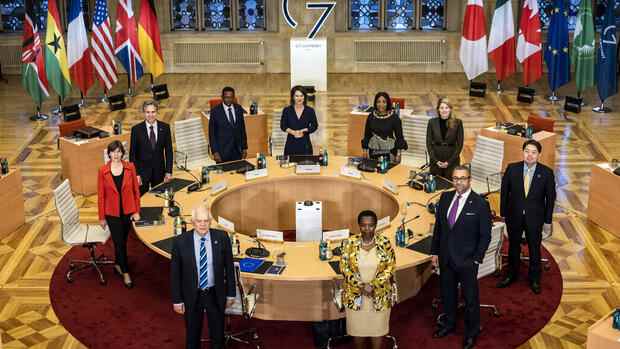Muenster The seven leading industrialized countries (G7) have warned Russia against using nuclear weapons in the war against Ukraine and have promised Kyiv extensive “winter aid”. Federal Foreign Minister Annalena Baerbock emphasized that the G7 community of states would “support Ukraine’s struggle for survival as best as possible” at the end of the G7 meeting on Friday in Münster, Westphalia. This will continue for as long as necessary. Only Putin alone can stop this war, “the Russian regime’s attempt to bomb Ukraine in the dark and cold.”
The G7 of the seven leading Western industrial nations, of which Germany will chair until the end of the year, agreed on a coordination mechanism. The required systems such as generators and water treatment equipment are to be delivered to the Ukraine in close international coordination. A donor conference will be held in Paris on December 13th. Ukraine will be helped “to survive this winter”. Almost 40 percent of the electricity, heat and drinking water production was destroyed by Russian attacks.
According to the final declaration of the group of states, which includes Germany, the USA, Japan, Canada, Great Britain, France, Italy and the EU, Russia is trying to “terrorize” the Ukrainian civilian population. US Secretary of State Antony Blinken said Russia is trying to “make up for its defeat on the battlefield by bombing Ukraine to the ground if it cannot take it by force.”
Together, the G7 countries condemned the “irresponsible Russian nuclear rhetoric” as unacceptable. Should Vladimir Putin use nuclear weapons, it would be “devastating – for him too,” said Blinken, threatening a harsh counter-reaction from the West.
Top jobs of the day
Find the best jobs now and
be notified by email.
The fact that China’s leadership spoke out clearly against a Russian use of nuclear weapons during the visit of Chancellor Olaf Scholz (SPD) was “an important sign,” said Baerbock.
The Federal Foreign Minister found words of praise for the Chancellor’s trip to Beijing.
(Photo: IMAGO/photothek)
In Münster, the Green politician also addressed her disagreement with Scholz on China policy. It is an “added value of democracy to argue honestly on the matter,” said Baerbock. She had criticized Scholz’s decision to sell the Chinese state shipping company Cosco a 24.9 percent stake in the Tollerort terminal in the port of Hamburg. The Greens and the FDP also called for the Chancellor to take a tougher stance towards Beijing.
The development of a new German China strategy is taking place in the federal government in close coordination between the Federal Foreign Office and the Chancellery, said Baerbock.
Strong condemnation of Iran
In connection with the Ukraine war, the G7 also issued a warning to Iran: If Russia continues to escalate the war and other countries help, the economic costs for these countries will continue to increase. This is primarily aimed at Iran, which supports Russia with drones and, according to information from Kyiv and Washington, is planning to deliver missiles.
In the event that the Iranian leadership continues to support Russia militarily and continues to use massive force to suppress the opposition in its own country, the seven leading industrial nations have already agreed on new punitive measures. However, these are imposed individually by the EU, the USA, Canada, Japan and Great Britain, since the G7 as an organization cannot decide on the sanctions. The leadership in Iran is a “regime that doesn’t give people a chance to live in freedom,” said Baerbock. That is why “the most massive sanction packages were put together in the face of the most massive violations of human rights”.
Listen to our Today podcast: How are the G7 countries reacting to the unrest in Iran?
In order to further weaken Russia financially, the G7 also initiated a process to cap the price of Russian oil. Together with Australia, the industrialized countries agreed to set a fixed upper price limit for oil deliveries by sea. A specific starting price has not yet been determined.
The price cap is to apply from December 5 for crude oil from Russia and from February 5 for oil products. It is intended to limit Russia’s ability to finance the war without affecting global oil supplies. Russia has already threatened to stop supplying oil to countries that set price caps.
US Secretary of State Blinken emphasized that Russia must continue to sell oil “so that the Russian economy can still function at all”. However, the West will cut Moscow’s income. In their statement, the G7 urged all oil-producing countries to “increase their production, which will reduce volatility in energy markets.”
More: G7 states want to punish Iran for aiding Russia
